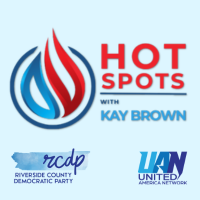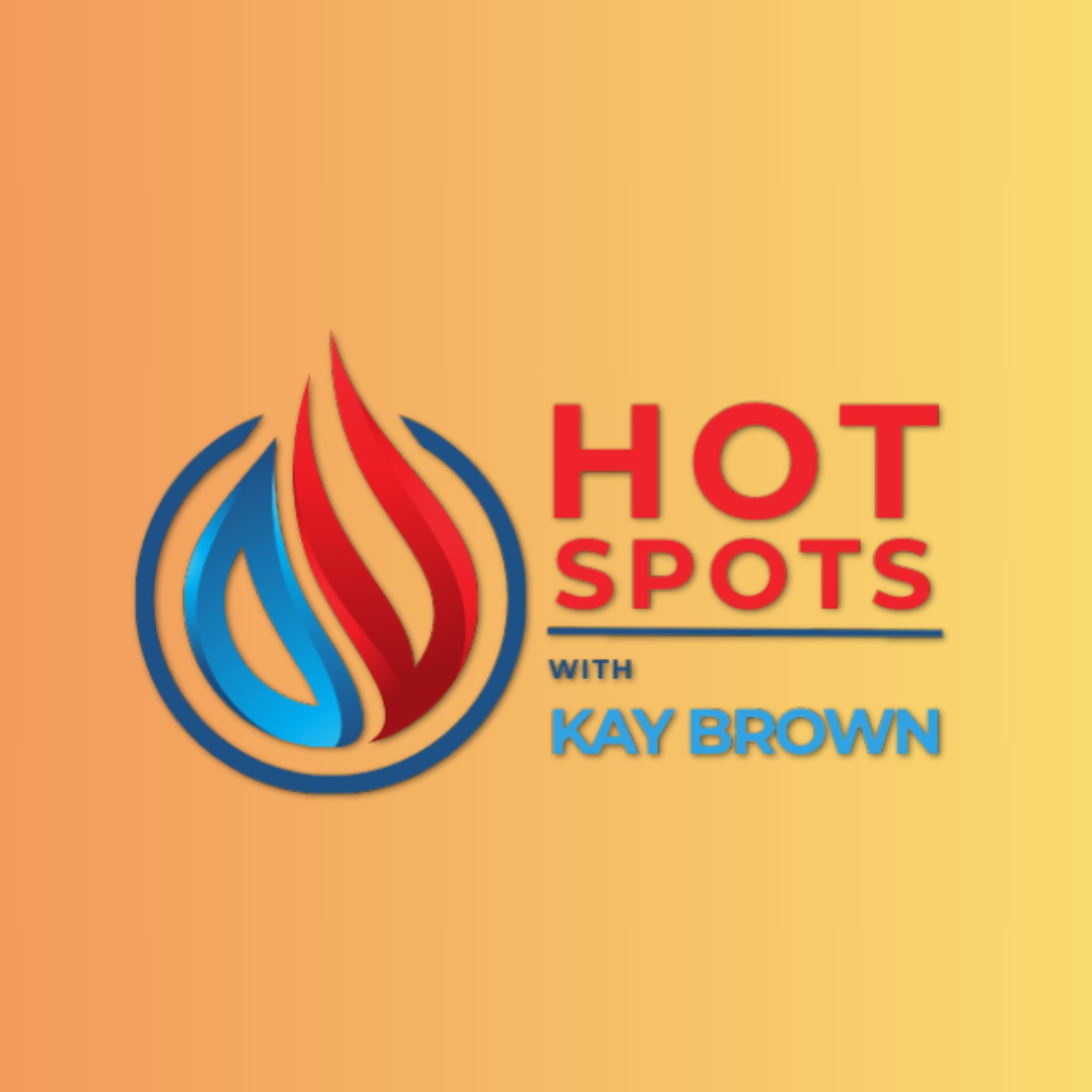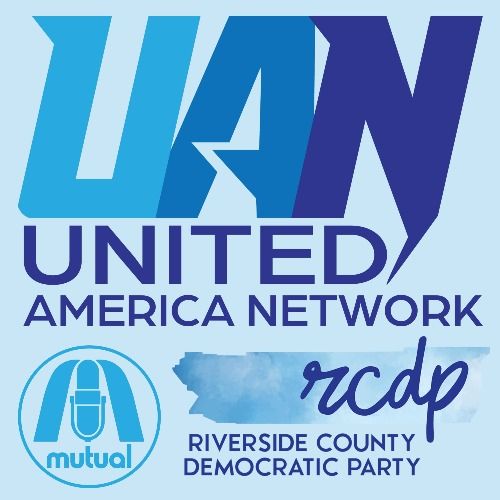Susan Morgan | Grassroots Power: Building Democracy Through Everyday Personal Connections
In this powerful conversation, activist and Indivisible Marin founder Susan Morgan joins host Kay Brown on Hot Spots to discuss how ordinary citizens can help defend democracy through simple, meaningful actions in daily life. From grocery store chats to t-shirt messages, Morgan explains how personal outreach—what she calls “common-sense relational organizing”—can help build the civic momentum needed to counter authoritarian threats. Drawing inspiration from Erica Chenoweth’s 3.5% rule, she emphasizes that sustained, nonviolent participation from just a small percentage of Americans can change the course of history. Listeners learn about Indivisible Marin’s Personal Outreach Toolkit, the upcoming nationwide “No Kings 2” protest, and how everyday conversations can spark civic engagement and hope. This episode is a call to action: show up, speak up, and help strengthen the movement for democracy, justice, and inclusion at home and across the nation.
Takeaways:
- Relational organizing is the most effective way to inspire civic action.
- Only 3.5% of the population actively resisting can shift regimes.
- Indivisible Marin’s outreach toolkit offers accessible ways to start conversations.
- Personal gestures—like wearing a message shirt—can open dialogue.
- Honest, empathetic communication builds trust and unity across divides.
- The “No Kings 2” protest on October 18 seeks mass participation.
- Protests strengthen community resolve, not just public opposition.
- Every person can contribute—whether through volunteering, organizing, or showing up.
#HotspotsPodcast #KayBrown #UnitedAmericaNetwork #ChristianNationalis #IndivisibleMarin #GrassrootsAction #SaveDemocracy #CivicEngagement #NoKings2 #EricaChenoweth #RelationalOrganizing #PersonalOutreach #BuildCommunity #ProDemocracy #StandUpSpeakUp #ResistanceMovement #MarinCounty #2026Elections #NonviolentAction #ActForChange
Transcript
Kay Brown, Host: Hello. Thanks for joining. I'm glad you're here. I hope you're having a good day. In these podcasts, we've been delving into Christian nationalism and what those of us who want to save democracy in the rule of law can do to push back.
Kay Brown, Host: Christian nationalism is part of the reason we're facing an authoritarian takeover of our government and the assaults on democracy, rule of law, our health and our personal freedoms. Things seem such a big mess, gut wrenching, almost surreal every day. Another avalanche of bad news trumps everything everywhere, all at once.
frighten us, and silence us. [:Kay Brown, Host: I'll just mention a few. Trump and his policies are losing popularity rapidly. Awareness is growing of the scandals, corruption, cruelty, and the threats to our health. Loss of access to vaccines, loss of our personal freedoms of failing economy. The resistance is gaining momentum. Millions are engaged already, and more will be soon.
hard work and unified action.:Kay Brown, Host: A question I get [00:02:00] asked a lot is, what can we do? So I wanted to invite our guest today, Susan Morgan, with. Indivisible Marin to discuss some of the things she's been working on. She's been building the resistance through personal outreach and put together a toolkit that tells us how we can work on that and do that.
Kay Brown, Host: She is the founder and director of Indivisible Marin, and that's Marin County, California. So welcome, Susan. Thank you so much for joining me.
Susan Morgan, Guest: Thank you so much. Kay. Thank you for inviting me to speak to you and your guests.
Kay Brown, Host: Tell me about the project you've set up to build the resistance through personal contact and outreach.
Kay Brown, Host: Encouraging people to talk to other people.
ctice every day in our daily [:Susan Morgan, Guest: We started in 2017. That's when. The Indivisible movement nationally began. So we, we were one of the early chapters. We've now grown to about 13,000 members around the country. Most are in California. Many are in Marin, but we do have people all around the country that are a part of Indivisible Marin.
want to make our programming [:Susan Morgan, Guest: So historically organizers such as the Democratic National Committee or state parties or grassroots organizations have always stressed with volunteers that. What has been called relational organizing is the most impactful way to change people's minds about, for example, how they might vote or change their behavior, for example.
little bit. They don't wanna [:Susan Morgan, Guest: So what we have created are some ideas for how people in their daily lives can begin to have conversations with others about politics and about what Democrats stand for and about. Elections when we get to elections in a few simple steps.
Kay Brown, Host: So this is a really important strategy for a lot of reasons.
et out of this authoritarian [:Susan Morgan, Guest: Yes. Ha. I'm happy to. And you're exactly right that even though, people have become more and more engaged as volunteers, citizens are becoming more active in. Fighting for our democracy, taking action through local groups. As you said, we're still not to this magical 3.5% of active citizen engagement that we're shooting for.
ience and largely due to the [:Susan Morgan, Guest: Currently. In the United States, for example, the largest protest that we've ever had was the No Kings protest. Back a couple months ago. And for that protest we got to, I think close to about 10 million people [00:08:00] showing up. But that's still not to the level of the 3.5% and. For an organizer like me who has spent seven years, trying to recruit more people to join Indivisible Marin, trying to recruit more people to get involved, I have sensed that we might be sort of hitting a wall in terms of there's a certain segment of the population who are very politically tuned in and motivated, and then there's a lot of people who care. But they really don't have a sense of how do I get started? What exactly can I do to help? So this is where we came up with the idea that what we all need to be doing is having conversations in our daily lives with these types of people that we might not, who might not [00:09:00] normally decide to search out a volunteer group.
perience with this during the:Susan Morgan, Guest: [00:10:00] And what would happen is people would either. Sometimes give me a thumbs up. That's a conversation opener because if they gave me a thumbs up, then I could say, yeah, hey, I'm so glad you agree, Dems, make life better. And did you notice on the back of my T-shirt there's all of the values that Democrats stand for?
Susan Morgan, Guest: And I'd turn around and have them look at the back of my t-shirt and it was an opportunity to say. Since you agree, have you thought about joining a local group? Have you thought about volunteering? And I would have a little card with me that I could give to them and say visit us at indivisiblemarin.org.
We are working on a special [:Susan Morgan, Guest: Join the volunteer work to help pass Prop 50. But back to my example, I'm, I wore my yes on Prop 50 T-shirt today to the gym and I was in an exercise class, so there was mirrors all around and people were definitely looking at me. A couple people came up to me and said, wow, that's the first, Yes On 50 T-shirt I've seen that's so great.
nother approach that doesn't [:Susan Morgan, Guest: And common chit chat is, Hey, how are you? How are you doing today? And really nothing of any import is exchanged. Right? Just pleasantries well. What we suggest in our toolkit is that instead of saying something benign I'm fine, little chilly today try on for size. Saying something like I'm really not that great.
's happening in our country. [:Susan Morgan, Guest: Been able to engage with in this way to then gently lead them toward ways that they can become more involved, which really is joining a local group. Because working as part of a community is what keeps us all motivated to keep, keep up the fight because it is, it's draining and it's a marathon. [00:14:00]
Kay Brown, Host: It is indeed.
Kay Brown, Host: And where can people find the toolkit on your website?
Susan Morgan, Guest: Yes we have a website, it's indivisible marin.org. And at the top nav bar, we've divided it into sections such as Fight where we cover. Protests and such elect where we cover elections. And another category is build and in the build section. And what we're talking about there is building for the future, right?
work is about protesting and [:Susan Morgan, Guest: We want to be doing this continual building. And a lot of that is building trust, right? These conversations, these conversations we can all have in our daily lives instill more trust between perhaps strangers or perhaps people who live in the neighborhood but you don't typically interact with. So the more we can build trust.
a toolkit that you can click [:Susan Morgan, Guest: So it was easy to find there, but you know what, it's, it's funny, we, we created a toolkit because people want instructions, you know, like, how I want instructions, I want a toolkit. So we created one. But again, it's so much common sense and we really invite everyone to think of their own techniques.
Susan Morgan, Guest: Like I gave you a couple examples. Wear a t-shirt as a conversation prompt or. Answer honestly, when people ask how you're doing, if you're feeling down about what's happening, just be transparent, put it out there. But your listeners may be thinking about other ways that they might engage with people that historically they've been a little timid.
, so my generation, [:Susan Morgan, Guest: But one's manner is so important. You want, you wanna approach these conversations with an openness and a curiosity to listen, to someone who maybe disagrees. To ask them questions. If, for example, let's just say I'm wearing my Dems, make life better t-shirt, and someone in the grocery store says to me, I don't think so, I don't think Dems [00:18:00] make life better.
Susan Morgan, Guest: Then the challenge is for me to be receptive and say tell me more about that. You know, what is it about Democrats that you feel isn't helping make your life better? And then, you know, just kind of feel your way as another human being, talking to a human being, because very likely you'll find some.
g an open conversation opens [:Susan Morgan, Guest: Are crucial and need to happen, and we recruit our volunteers to do all of those traditional forms of volunteer outreach, voter outreach, but these casual conversations out in the world can pave the way they can open the door. And there were some times, again, going back to last year when I was having my.
ou know, maybe all Democrats [:Kay Brown, Host: So what opportunities are coming up for protesting? I understand Indivisible is organizing a big protest across the country in a coming weeks. Yes.
Susan Morgan, Guest: Yes, absolutely. October 18th is being billed as no kings to. The No Kings protest that took place.
Susan Morgan, Guest: I'm forgetting which month. Might have been August. I my memory's failing me, but it was a couple months ago, was the largest day National Day of Action in US history. And so now the challenge is to. Make it even bigger. So we need
million, [:Susan Morgan, Guest: Yeah. Thanks for doing the math for me.
Susan Morgan, Guest: Yes. 12 million. And, you know, again, these are, um, aspirational goals. They're aspirational in their guideposts, but the reality is we need more and more people to become. Actively engaged because if you recall, when I first described what Erica Chenoweth found, it's not just 3.5% of people showing up on a single day to protest and then be like, okay, I did that.
the founders of Indivisible [:Susan Morgan, Guest: A lot of people, I hear some cynical people talk about the protests saying what's really the point? Donald Trump isn't paying doesn't care. You're not gonna change Republicans minds by protesting. And I think that's fair to say in many respects, but they're missing the point because the point is that the protest.
ho are like-minded, that are [:Susan Morgan, Guest: And then we ask people at the protest. Please join a local group, get involved. Do you know, we, we need you showing up at phone banks. The midterms are upon us practically. We need people canvassing in their neighborhoods. We need people donating to the cause. There's so many different ways that people can be doing helping in their daily lives.
it to a civic duty. I think [:Susan Morgan, Guest: And it was, the entire country was unified around the war effort and everyone felt they had a responsibility. And that's what I feel like we need to get back to, even though. Demands are on all of our lives. We have, jobs, we have our own children to care for carving out an hour a week, if that's what you can carve out, [00:25:00] matters.
Susan Morgan, Guest: For someone like me, I'm retired, I'm giving pretty much full time. And there's a range of. Ways that people can give, but I do personally believe that anyone who is worried about the direction of our country should be evaluating how they can carve out some time in their life to contribute.
Kay Brown, Host: Well, we're gonna leave it there for today. Susan. Thank you again for your interest and your advice and your suggestions. I think they're all great. I hope our listeners will join us again next week for Hotspots getting out of the situation we're in, takes a movement.
up. Push back on the wrongs [:

